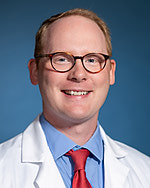 By Merin C. MacDonald
By Merin C. MacDonald
Michael Devine, DO, a physician and assistant professor of medicine in the Division of Hospital Medicine, is currently leading an innovative initiative to improve discharge orders at UMass. In a new conversation with Dr. Devine, he discusses the drivers of this initiative, results thus far, and goals for future applications. This interview has been edited for length and clarity.
What prompted your interest in launching the accelerating discharge initiative?
What initially prompted this work was some of my non-clinical duties. At the University and Memorial campuses, we have an acute care unit collaborative (ACUC), which is a dyad between a physician and a nurse manager in each of the acute care units. We meet monthly to review metrics including length of stay, discharge barriers, patient care progression, etc. In the process of being involved with that work, one of the areas of opportunity that arose was improving our discharge order time. In 2022, I was accepted into the [UMass Memorial] Quality Scholars Program to implement a limited pilot project with the internal medicine resident teams at the University campus, to try to improve their discharge orders by noon.
What was the rationale for the pilot and what have the results been so far?
We specifically looked at the metric of discharge orders before noon because when we initially reviewed the data, we found that the resident teams were about 10% lower than uncovered attendings. Because this was leading to prolonged length of stay, poor patient flow, and decreased patient satisfaction, we decided the goal for our internal medicine resident teams would be to improve discharge by noon to around 25% from 15%. Over the last year, our residents were able to reach that goal.
At the end of 2022, I was also awarded a DIGI grant for an expansion of this project into Hospital Medicine. For this project, we set a new goal of at or above 35% discharge orders by noon for all of Hospital Medicine at the University and Memorial campuses. We've been pretty close to hitting that since that time, averaging around 33-34%. Although we're not quite at 35% yet, it's a significant improvement in our discharge order by noon percentage. As a secondary metric, we are also looking at not only discharge by noon, but also our discharge by 2 p.m. This is slightly different because it is the culmination of the discharge order; the patient physically leaving their bed and being electronically removed from Epic. The ultimate goal is to try to get patients discharged as soon as they're medically ready and then have a bed ready for new patients coming in from the ER or ICU. We have seen an improvement in that as well, from a baseline of around 10% to 18-19% since we started the project. Although those numbers seem small, they're pretty significant improvements on our end as Hospital Medicine cares for a big portion of the acute care patients at University and Memorial.
I think part of the DIGI grant work this year was to provide sustaining effort toward this project and we're pretty close to a steady state or near completion. What was a huge benefit of the [DIGI] grant was to have that overlapping support, where we have been able to keep this as an ongoing project that is more or less sustaining and doesn't require as much hand-holding anymore.
Where do see the potential for expanded implementation?
I think the ultimate goal is to have this as a standard of work for all of the inpatient teams. There are other services like cardiology, pulmonology, liver, and surgery that could also implement this model, so I think the goal for this work could be to expand across the whole continuum of acute care. I don't know the exact data for those other services, but I think given that we were able to implement this within Hospital Medicine, it should be fairly straightforward to expand across the entire acute care spectrum.
Final thoughts?
I would like to acknowledge the work of the leadership and my fellow hospitalists. Dr. Kim Eisenstock has been really instrumental, from a leadership perspective, and Dr. Greg Leslie has been really supportive as well. I don't think that this work would have been as successful without their support and input. I would also acknowledge the work of the internal medicine residents because they're really doing a lot—they're trying to learn medicine while also working towards some of these operational efficiency-type things and I think they've been really enthusiastic and supportive. I've been really impressed by the way that they've been able to step up and have this be a part of their practice. We couldn't have done this without them. Finally, I would like to thank all the hospitalists in our division who have consistently implemented this work along with the residents.
Dr. Devine is a physician and assistant professor of medicine in the Division of Hospital Medicine. He earned his DO at Midwestern University in Downers Grove, Illinois, and completed his internal medicine residency at UMass Chan Medical School. He joined UMass Chan as an academic hospitalist in 2019.
